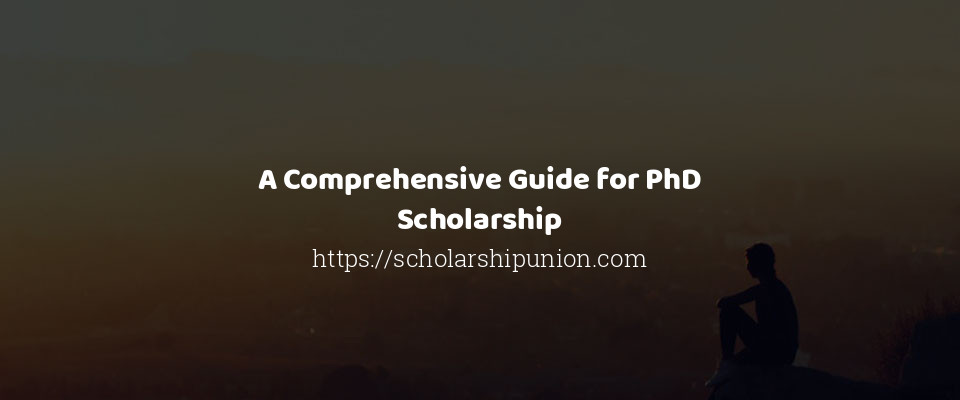A Comprehensive Guide for PhD Scholarship
Shamima Khatun
23 November 2023
401 views

Starting a Ph.D. program indicates a deep dedication to knowledge advancement. Though intellectually stimulating, the financial ramifications can be overwhelming. Getting a Ph.D. scholarship helps allay these worries and free up time for researchers to concentrate only on their work. Together, we can dissect the process of earning that much-desired scholarship.
PhD scholarships are monetary grants offered to candidates or students pursuing doctorates. Usually, they are determined by certain standards established by benefactors or organizations, research promise, or academic merit. Scholarships do not need to be returned, in contrast to loans.
Types of Scholarships
- Merit-Based: A merit scholarship is awarded based on the level of promise the student demonstrates, regardless of their financial status. A merit scholarship is typically provided to students with high academic achievement in specific areas, such as academics, athletics, or the arts.
- Need-Based: Need-based scholarships are awarded to candidates who belong to financially weaker sections. These kinds of scholarships are awarded to candidates to allow them to complete their education despite not being able to meet the financial requirements. Need-based financial aid is primarily awarded to students through grants, and every candidate should maximize this kind of aid before seeking other sources of help or quitting.
- Subject-Specific: These scholarships are tailored for students pursuing particular research areas.
- Demographic-Based: These types of scholarships are designed for specific groups, such as underrepresented minorities or international students.
Sources of Scholarships
- Universities: Most universities offer internal scholarships to attract and retain top talent.
- Government Bodies: Many governments support research initiatives by providing scholarships to local and international students.
- Non-Profit Organizations: Numerous NGOs, foundations, and trusts promote research by offering funding opportunities.
- Corporates: Some businesses provide scholarships in areas aligning with their interests or corporate social responsibility goals.
Crafting a Winning Application
- Clear Research Proposal: A well-articulated research proposal demonstrates your vision and preparedness.
- Strong Academic Record: Your past achievements set the precedent for your potential.
- Compelling Personal Statement: Narrate your journey, elucidating your passion for the chosen field.
- Stellar Recommendations: Secure recommendations from mentors or professionals who can vouch for your capability and dedication.
Navigating Eligibility
Every scholarship has its set of prerequisites. Ensure you meet the criteria:
- Academic Qualifications: Check if your prior degrees and grades align with the scholarship’s requirements.
- Residency Status: Some scholarships are exclusive to locals, while others cater to international students.
- Research Area: Your research must fall within the designated areas, especially for subject-specific scholarships.
Application Tips and Best Practices
- Start Early: Begin your scholarship hunt well in advance. It provides ample time for research, preparation, and meeting deadlines.
- Organize Documentation: Keep academic transcripts, research papers, and other essential documents handy and updated.
- Tailor Applications: While using a generic application for multiple scholarships is tempting, customizing for each can increase your chances.
- Proofread: Ensure your application is devoid of errors. Consider seeking feedback from peers or mentors.
Post-Application
Once your application is sent, be patient. Use this period to:
- Stay Updated: Regularly check your emails and the scholarship portal for updates or additional requirements.
- Prepare for Interviews: Some scholarships might require an interview round. Be prepared to discuss your research and aspirations.
After Securing the Scholarship
- Acknowledge: Express your gratitude to the awarding body. It’s both courteous and beneficial for future networking.
- Adhere to Guidelines: Some scholarships have stipulations like maintaining a certain grade or conducting research. Ensure compliance.
- Stay Engaged: Participate in seminars, workshops, or events your scholarship body organizes. It’s an excellent avenue for networking and collaboration.
Conclusion
Pursuing a Ph.D. is a commendable journey, and securing a scholarship can significantly alleviate financial concerns, allowing for a dedicated focus on research. Understanding the types and sources of scholarships, crafting a compelling application, navigating eligibility criteria, and adhering to best practices is crucial. Post-award, expressing gratitude, complying with guidelines, and actively engaging with the scholarship body enhance the overall experience. With patience, dedication, and strategic planning, aspiring researchers can successfully embark on their Ph.D. journey with the support of a well-deserved scholarship.